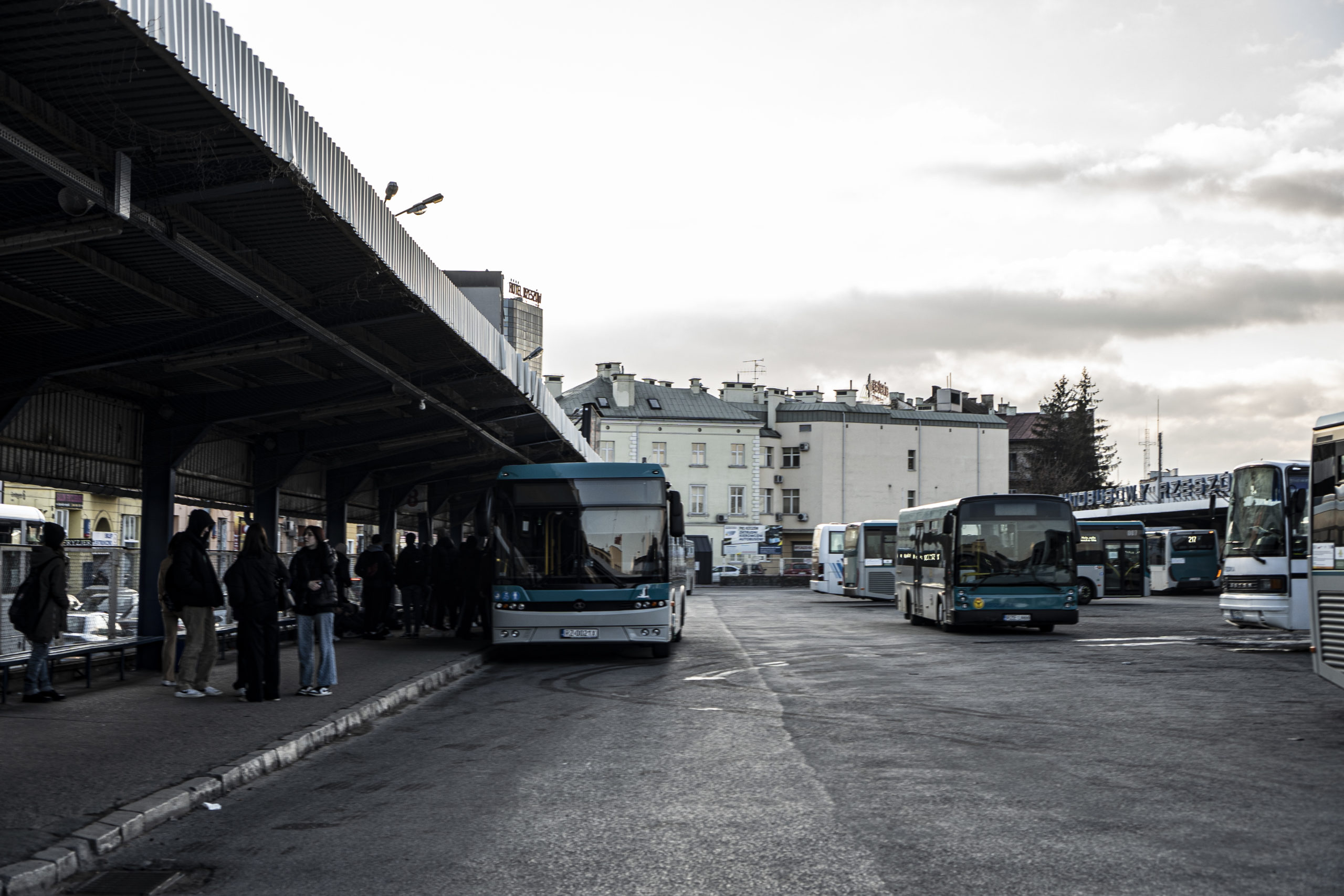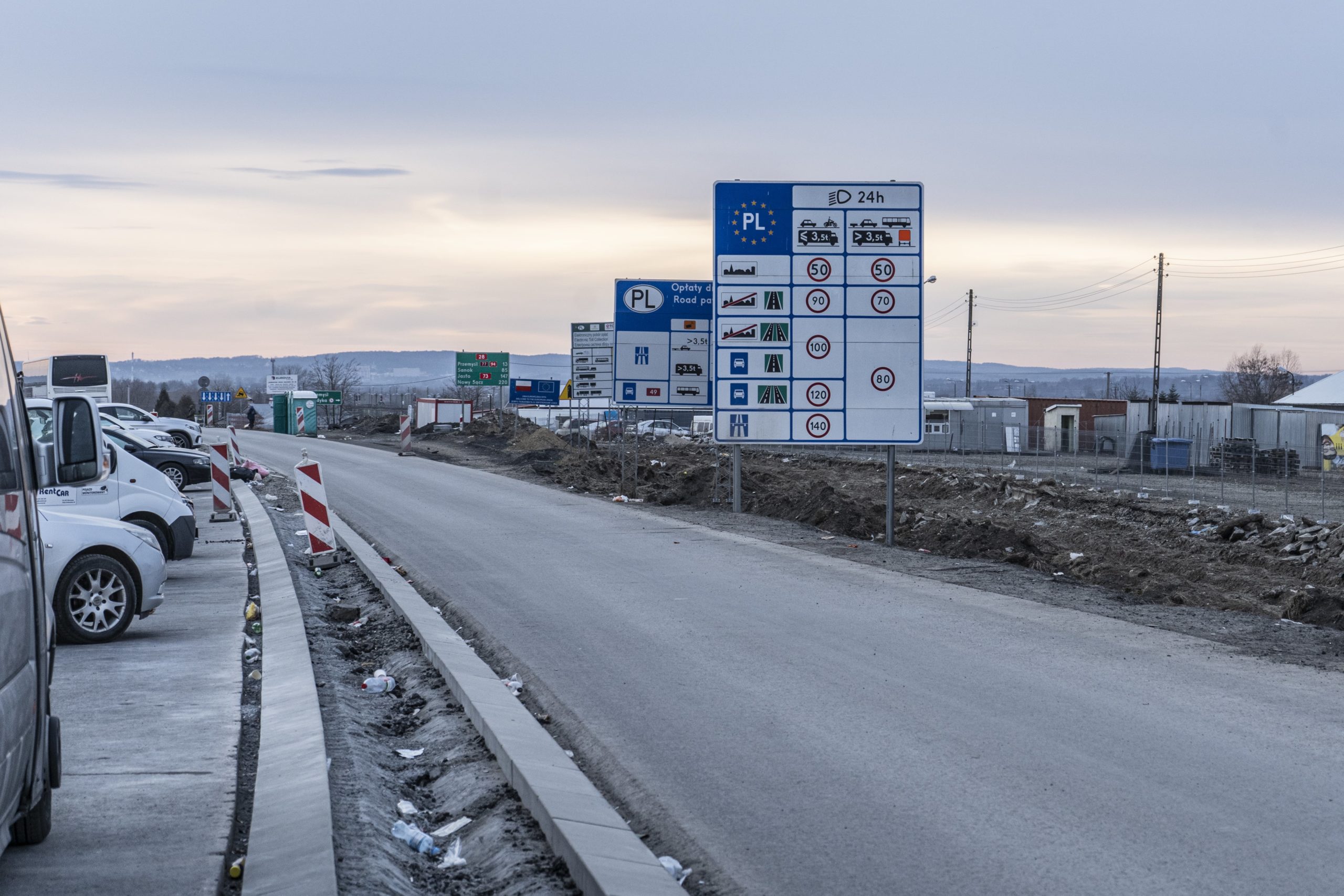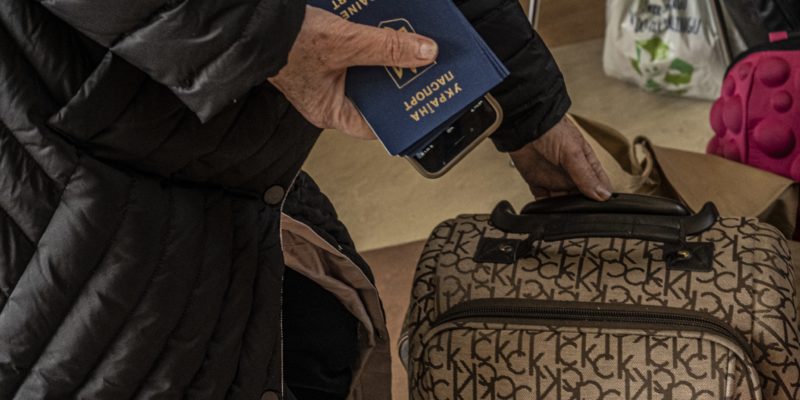“In Ukraine it has become impossible to book a bus to leave the country, even if hundreds of them depart from here every day; tickets can no longer be purchased in advance, via the internet, as was the case until the 23rd of February”.
Irina among those looking online, trying to reserve a spot on a bus to reach the other side of the border. A friend of hers has to leave, so she asks for help for her via a message to one of the many groups of volunteers who in recent weeks have sprung up on Telegram, Whatsapp and Facebook to coordinate aid and often help transport people on the run. “Tomorrow I might need it too – she explains – better to have the information in time”.

From Lviv, in addition to the trains connecting the main cities of Ukraine and Poland, before the war it was possible to take cheap buses and minivans to most European countries. Interminable journeys that ran smoothly, and were the ideal solution for those who carried heavy luggage with them. Today the means have multiplied, but also the numbers of people who set out on the road have skyrocketed: since the beginning of the war about 3.5million refugees have left Ukraine (UNHCR data updated to 21 March).
Meanwhile, Irina has found a way to get the ticket: the solution was to buy it from a Polish travel company, and pay for it by credit card at the price of 100 dollars, an enormous amount compared to the normal rates for a 150 km route in one country where an average salary is around 200 – 250 euros. Of course, there is always the option of trains and buses made available for free, but the risk is that you may end up stuck waiting (possibly even for days), before being able to catch one.
Near the railway station, every parking lot, street, open space, and even dirt road, has become a new stopping point for vehicles heading out of the country, as well as towards cities under siege.
The bus on which Irina booked seats is headed for Prague and departure is scheduled for three in the afternoon, but it is so full that the doors close an hour earlier, while the travel assistant checks the handwritten passenger list on a piece of paper. The driver leaves and ventures into Lviv traffic, which he slowly leaves behind. Seventy kilometres separate the passengers, refugees from half of Ukraine, from leaving behind their country; not knowing when they might be able to return.
A girl in a wool hat and tracksuit sits with a plastic carrier on her lap. There is no space to leave it on the ground, between the two rows of seats, at least until everyone takes their seats and manages to arrange their bags, containing the food they have brought with them for the trip, as best they can. If there are no delays, delays which are almost certain at the border crossing, the arrival in Prague will take place on schedule 26 hours from now. Rzeszów is the first stop, from there continuing to Krakow, then Katowice, Ostrava, and Brno before Prague.
The lady occupying the seat behind her gestures for her to leave that “luggage” in the corridor, no matter how tight it is, and whoever needs to get up will step over it. The girl then lets her cat out, picks him up, wraps him in a sweater and places the container near his feet. The animal does not make a sound and remains crouched on her lap, while she tries to let him drink some water. He is missing an eye and looks around with the other. She, the cat, her son and her elderly father who sits next to her, near the window, come from Kharkiv.
A little further on, a mother sits with her teenage daughter who is travelling half-lying down: her legs are burned, and she can’t keep her jeans on for too long. So she is forced to remove them, at least up to the border, where she will have to get out of the vehicle for passport inspection. It takes one hour to arrive at the border, and everyone realises it because the bus begins to slow down, until it stops in a long line of vehicles waiting to pass from one country to the other.
Along the sides of the road there are some workers who are building wooden structures where other spaces will probably be created for first reception. In the meantime, dozens of people walk past the queues, some with children by their hand, others dragging their luggage. “Normally it takes about two hours to Rzeszów – explains the steward who in the meantime has gone down to look for something to eat and has just returned with two paper cups full of chocolate flavoured cereal – with the war, times have become incalculable they depend on how many people arrive at the same time, with all the passports to be checked one by one”.
As hours go by, it is impossible to advance even by a metre. The sun goes down and the lights of the small kiosks on the side of the road are switched on. The wooden gazebos have been completed, only the tarpaulins are missing but now the darkness does not allow for the continuation of work. People on foot continue to arrive, leaving a few kilometres behind the “drivers” who stop before the border. Some get off the bus to stretch their legs and breathe a breath of fresh air because the space in the bus has become increasingly narrow over the hours. A Polish Red Cross doctor comes aboard to check in with the girl with the burns – she has brought bandages that will protect her skin from contact with the rigid fabric when she has to get dressed.
There are a few metres to the border: another three hours pass, and by now it is ten o’clock at night. By now everyone needs to eat and use the toilets. Nobody talks, the girl with the cat falls asleep. Mrs. Nataliya, who left Kyiv two days earlier, tries to read a book, the only one she took with her on her escape. At midnight the border police finally get on board: two young women in camouflage make their way through the corridor and collect all the passports one by one; they say to wait on board.

The bus advances at a walking pace until it reaches the shelter of the Ukrainian customs offices. Many people decide to get off, even if it is not necessary for the checks. Inside the offices, there is a line of dozens and dozens of women, children and elderly people waiting, who pass an empty entrance and then find themselves crowded into this dimly lit space, with two dim neon lights on the walls, but which has nonetheless been adapted to provide a modicum of welcome. On the right are stalls with some volunteers handing out borsh [a common soup in Eastern Europe and Northern Asia], while others approach to offer packs of chips and chocolate bars. The border police return on board and deliver the documents to the assistant of the bus company, who calls all passengers by name. Three are missing as they’re in line for the bathroom, but they arrive shortly after.
The journey restarts as the three lines of vehicles must necessarily be reduced to one, and this bottleneck marks the entry into Europe, in Poland, from the Korczowa crossing. In the meantime, almost another hour has passed. This time the passengers are invited to get off and to show their documents directly to the officers who remain seated in their boxed positions. Two long lines of people are created, each being asked for their surname and after the check, they pass into a waiting room where a table has been set up with sandwiches, bananas and hot tea.
The exit is on the other side, and the bus is parked a few metres away. People take their seats. Almost twelve hours have passed and a scant eighty kilometres have been covered. We leave, finally in Poland, and the traffic disappears in a few minutes. The border motel sign is the last light we see from the windows, then darkness returns. In a collective sigh of relief, all the passengers seem to have dozed off, the border has been crossed, now the rest of the journey is ahead, another fifteen hours for those who want to reach Prague, less for those who stop in Poland, or continue the journey via other means.
Rzeszów is the next stop and the bus parks in the deserted yard of the terminal. A few steps away is the train station, which is still open with volunteers at work at half past two in the night.
Among them is Alex, who arrived from Montenegro with a Caritas delegation, and will stay here for eight days.
“When I heard what was happening in Ukraine, I identified with the fate of these people – he says – because my country too has a difficult recent past, with the war in the Balkans, the recognition of independence from Serbia, the disputed territories; the suffering. Every week a group of volunteers arrives. We sleep in a hospital in Przemysl because there are no beds elsewhere. There are women and children who spend the night here at the station, but no one should arrive until five o’clock today: we will have time to prepare more tea and put away the last packs of food.”
Cover foto by Ilaria Romano.









